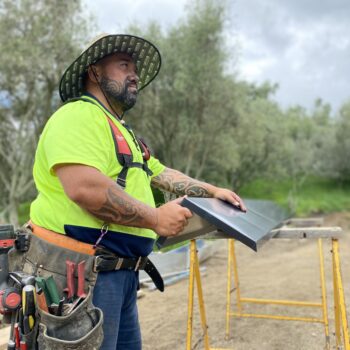Degrees of inspiration
A special report by NZBusiness investigates NZ’s latest MBA programmes.
The latest MBA programmes at New Zealand’s leading universities are designed to produce well-rounded leaders prepared to navigate today’s complex business landscape. A special report by NZBusiness investigates.
Type ‘MBA New Zealand’ into Google and it’s surprising how many options appear on your screen. When it comes to leadership development and transformation, the MBA remains a key enabler for personal career growth and its ongoing popularity is hardly
surprising.
Studying an MBA is not for the faint-hearted – it requires a significant commitment of time, energy and investment. Students must also choose a programme that fits their career ambitions and personal circumstances.
As is the case around the world, New Zealand’s MBA landscape is highly competitive. With every new year the country’s leading providers adjust their programme content to reflect the changing business landscape and meet the needs of participants. 2024 is shaping up to be a particularly exciting year in terms of options and outcomes.
At the Waikato Management School, MBA Director Nadia Trent says their 2024 programme again emphasises personal leadership transformation and “immediately useful business knowledge”.
“These threads are pulled through in the way we’ve designed our papers around complex managerial issues instead of disciplinary boundaries,” explains Trent, “as well as our practical assessments and value creation experiences, and the authentic coaching approach to leadership and career development.”
Talk to any former MBA student and they’ll say that a warm and caring learning environment is also a major point of difference.
“An MBA is as gruelling as it is rewarding,” says Trent. “Often the difference between success and failure comes from the relationships that our students have with each other, our teaching team and our programme office.”
Shane Riley, CEO of Vertex Group, a recent Waikato MBA graduate, is quick to acknowledge the post-MBA benefits. “I found a new me in a lot of ways. I found my purpose, as corny as that sounds. Even before formal graduation I moved into a leadership role and the MBA truly has provided me with the skills and resilience to be successful.
“Leadership roles are incredibly challenging, and I can hand-on-heart say that without the MBA I would not be half the leader I am today.”
Riley says the MBA taught him the value of learning each day. “Now a day doesn’t go by that I’m not learning, and helping others to do the same.”
Another Waikato graduate, Rosie Miller, who has always worked in HR and has a keen interest in business, says her MBA has opened her eyes to the endless opportunities within it. “I expected it would support me with growing my business acumen and offer frameworks and tools I could use in my career. However, it has done so much more than that.
“I was surprised by how much we focused on our personal growth and leadership style, and challenged limiting beliefs to step forward into our potential.”
Miller says the absolute highlight of the whole MBA experience was the week-long study tour to Hanoi in Vietnam. “Having the opportunity to apply our course learnings, engage with Kiwi businesses looking to enter Vietnam, and explore the business environment over there was an experience I’ll always remember.”
She also appreciated the entire MBA programme structure. “Using a hybrid model of teaching online and in-person offered a great balance when working full-time.”
Asked if the Waikato MBA transforms careers, Trent says it’s more about transforming the people who have the careers. She says the transformative nature of the programme, especially through the leadership and value creation papers, is a “too-well-kept secret”. “It’s not necessarily in the ‘what’ of those papers, but in the ‘how’.”
Producing well-rounded leaders
Leadership is also a major focus of the University of Canterbury’s MBA programme. UC’s MBA director Elsamari Botha says its emphasis on collaboration with industry also sets it apart.
“It is designed to produce wellrounded leaders who are adept at creating and growing international organisations,” she explains.
“This is achieved through handson opportunities to engage with the latest technologies and practices, which particularly appeals to those looking to lead in a digitallytransformed business landscape.”
The UC MBA has a unique co-teaching model, which involves both an academic and an industry expert co-teaching each class. “This ensures students receive a balanced education that combines theoretical knowledge with practical, real-world insights,” says Botha. “This co-teaching model particularly appeals to professionals looking to bridge the gap between academic theory and business practice.”
The UC MBA was redesigned in 2019 to closely align with contemporary business needs – therefore it includes both progressive and core global MBA content. Study options and duration is flexible, and there is a range of electives and unique course offerings available, such as Digital Transformation, Managerial Finance and Business Sustainability.
Botha says the UC MBA primarily appeals to aspiring and accomplished business leaders who are looking to upskill through postgraduate study, make a career change, and gain relevant business connections and experiences.
“The majority of our students are doing this while working at the same time. It’s suitable for those with at least five years of work experience at an appropriate level, and who have a desire to be part of a globally recognised programme that focuses on innovation, digital transformation, and responsible leadership.”
The outcome of all this is wellrounded business leaders who are prepared to navigate and lead in today’s complex and evolving business landscape – leaders such as Paul Dolan, who was principal of a primary school when he started his UC MBA.
“As a result of the MBA I’m now a business partner for a business consultancy,” says Dolan. “It’s been life changing. I’ve benefited hugely, not only from the lecturers and academic staff, but from my classmates. And I’ve made lifelong friends and business partners as a result of that study.”
Kirsty Tyro is another graduate who found the UC MBA’s leadership training vital for giving her a strong sense of self-awareness and perspective in terms of how she leads others.
“It’s definitely put me into a growth mindset, and taught me to operate outside my comfort zone.”
Elsamari Botha says that in addition to offering classes in a hybrid manner in order to remain as flexible and accessible to their target market as possible, The University of Canterbury is also launching the Commitment to Continuous Learning (CCL) programme, which allows UC MBA alumni to come back and do one free course per year.
“This illustrates our commitment to continuous learning and the ongoing development of leaders who join our programme.”
New approaches
The University of Auckland Business School is another of New Zealand’s world-class MBA providers, and is the first internationally triple crown accredited MBA to have a ‘Te Ao Māori Business’ course, which is developed by world-leading experts in the areas of DEI, leading in complexity, and the indigenous economy.
“This course, among others, will guide our students on how to navigate troubling waters to greater cultural competence and confidence,” explains the university’s MBA Director Mike Lee. “Social-Cultural factors aside, we have also completely redesigned our business decision making course to include Big Data, analytics, AI and digital transformation.”
Another course unique to the University of Auckland MBA is its ‘Global success: Scaling Up’ course. Kiwis are renowned for their innovative number 8 wire ‘start-up’ mentality, says Lee, but where the country is falling short is our ability to go beyond start-ups and to ‘scale-up’.
“This unique course offered for the first time in our revamped MBA combines state of the art research and covers the latest developments in internationalisation, cross country analysis, and export strategy.”
He says beyond the courses that MBA students will enrol in, there are also some higher-level themes operating in the background.
“For example, a theme on Inclusive Capitalism, a theme on Sustainability, Digital Transformation, and Professional Skills, to name a few.” Furthermore, their MBA is now delivered in conjunction with Auckland Online, a business unit set up by the University to deliver specialised online learning.
“This is a significant change, as it will allow people who live outside of Auckland to access our world-class MBA program, which is incredibly well regarded,” says Lee.
“Being a part of our MBA enables our students to be routinely exposed to many opportunities that simply do not avail themselves at other institutions. Week-long innovation sprints that are run in conjunction with Queensland University of Technology and Massachusetts Institute of Technology, or the hosting of a visiting MBA cohort from Stanford, are just two examples of the amazing opportunities that specifically sought collaboration with The University of Auckland Business School.”
There are often multiple pathways for people to access an MBA in New Zealand. At the University of Auckland, regulations dictate that all students must have a previous Batchelors degree with a minimum grade point equivalent (GPE).
Accreditation also requires that all students have at least three years’ management experience and five years of work experience.
“But in reality, the average age of our MBA students is 35, with ten to 15 years’ work experience,” says Lee. “They’re hungry for knowledge and career progression, believe in self-improvement and self-efficacy, and have an ambition to lead.
“Our new MBA will continue to preference these types of go-getters; the only difference is that we are now able open up our MBA to nationwide talent.”
Take care comparing MBAs
There is much to be aware of when shopping for the most suitable, and compatible, MBA.
“Be realistic about the drawbacks of online learning. While it provides flexibility, there are limitations in terms of learning efficacy, interactions with peers and motivation,” advises Waikato’s Nadia Trent. “We use weeknight online sessions only to complement our weekend face-toface sessions.”
Have a deep look at the papers included in an MBA too, she suggests. Are the topics relevant to the business challenges leaders in your organisation are facing? Do the assessments seem like they will equip you to apply new knowledge in your own context? And is there a good mix of academic and industry expertise across the papers?
“Meet the alumni and current students if you can,” suggests Trent. “Find out from them why they’d recommend a particular MBA.”






